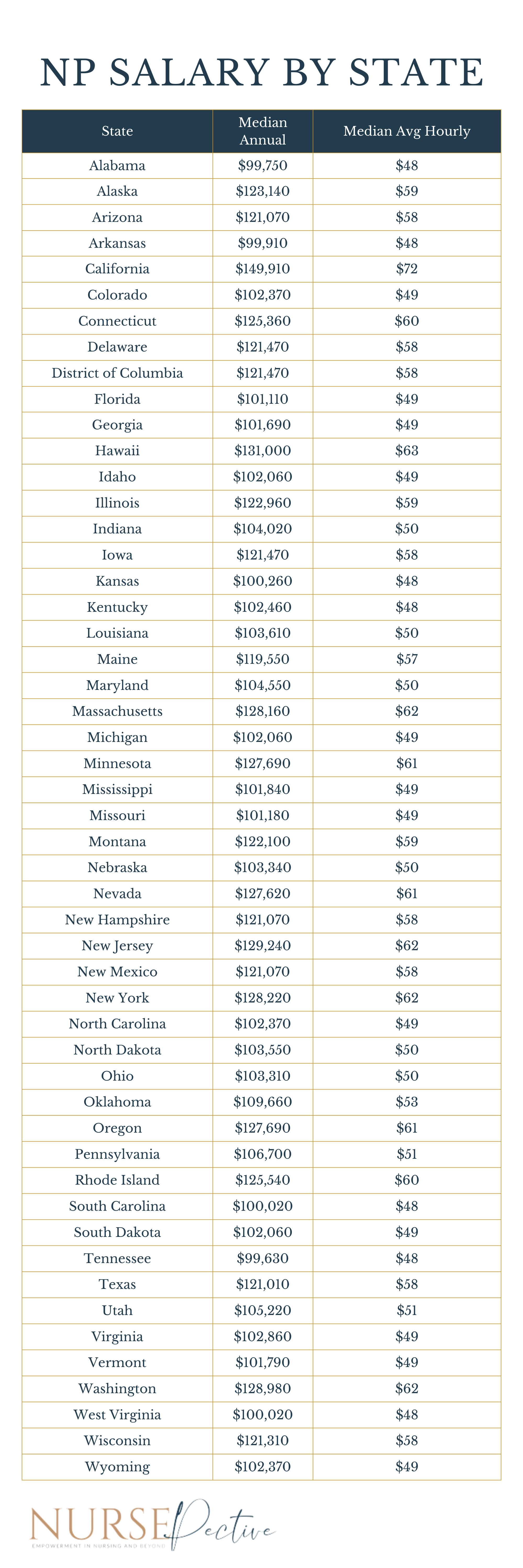
If you're a nurse looking to get into a new career, it might be time to consider becoming a Nurse Practitioner.
Nurse Practitioners are registered nurses who have completed a master's degree in Nursing and advanced clinical training. They can treat patients in a solo practice or work alongside doctors.
They have years of experience under their belts and have seen just about every kind of patient situation, so they know how best to handle any situation that comes their way.
But what do you need to know before deciding whether becoming a Nurse Practitioner is right for you? And is it really the right move for your future?
This guide will answer all those questions and more! It's full of tips, tricks, and advice from some of the top nurse practitioners today.
You'll learn everything from how much money you can make as an NP, which states are best for finding employment opportunities, and how to get started if this is your first time going back to school since high school (and even if it isn't), and much more!
So scroll down and keep reading!
What Is A Nurse Practitioner?


Nurse practitioners are advanced practice registered nurses (APRNs) who have earned a master's degree in nursing and additional training that allows them to diagnose and treat patients.
Nurse practitioners work with doctors, but can also practice without a physician's supervision.
The scope of nurse practitioner education includes advanced nursing theory and clinical practice, including pharmacology, pathophysiology, and behavioral sciences. Nurse practitioners must be able to assess patients, develop treatment plans and provide care under the direction of other healthcare professionals.
Their training also includes:
Developing care plans for patients, including monitoring progress and determining whether treatment is working as expected.
Prescribing medications when necessary (after completing the required training).
Ordering lab tests or other diagnostic studies.
Counseling skills such as providing emotional support for patients.
May supervise staff nurses and other health professionals, such as physician assistants (PAs).
6 Steps to Become a Nurse Practitioner


Becoming a nurse practitioner is not easy. You need to be dedicated and passionate about helping people. But it's worth it!
According to the Bureau of Labor Statistics, nurse practitioners earn a median salary of $118,040 per year.
If you are ready to commit, here is everything you need to know about becoming a nurse practitioner.
Step 1: Get Your Bachelor's Degree
The first step to becoming a nurse practitioner is to complete a bachelor's degree in nursing. Earning your bachelor's degree will prepare you for graduate school and give you the necessary foundation in the sciences and liberal arts.
Step 2: Pass the NCLEX Exam
Pass the National Council Licensure Examination-Registered Nurse (NCLEX-RN). This exam is required to become licensed as a registered nurse in most states and territories in the United States.
Step 3: Gain Experience in Nursing
NPs must have experience working as registered nurses (RNs). This experience can come from any type of healthcare setting that involves direct patient care, including hospitals, outpatient clinics, hospices, and nursing homes.
You should also volunteer at local charities or community health centers to gain valuable experience interacting with patients who might have complex medical needs.
Step 4: Apply to Graduate School
After earning your bachelor's degree, apply to a school that offers a master's degree program in advanced nursing practice, specifically Nurse Practitioner Programs.
These programs are offered at many schools across the country and typically include clinical experience and coursework in advanced nursing and patient care.
You apply directly through each school's admissions program, which typically requires an official application form, transcripts from previous degrees, and other supporting materials.
Step 5: Obtain Licensure as a Nurse Practitioner in Your State
To become board certified as an APRN, you'll need to take one or more certifying exams from the American Nurses Credentialing Center (ANCC).
The ANCC offers associate and baccalaureate level certification exams for APRNs in five specialties — family nurse practitioner, adult gerontology acute care nurse practitioner, adult psychiatric/mental health nurse practitioner, pediatric acute care nurse practitioner, and pediatric primary care nurse practitioner.
Step 6: Search for a Nurse Practitioner Job
You've made it to the last step! Searching for a nurse practitioner job can be challenging, but many resources are available to help you land that dream job.
- The National Student Nurses Association (NSNA) has an online community with thousands of members and forums where you can post your resume and connect with employers directly.
You can even join their ambassador program, which offers excellent networking opportunities and career advice from experienced nurses.
- If you're looking for work as an NP in a specific state, then you should check out Nurse Practitioner Central. This website lists jobs in every state and even includes international job postings.
How Many Years Does It Take To Become A Nurse Practitioner?


The time it takes to become a nurse practitioner depends on several factors, including your level of education, whether you have a bachelor's degree or a master's degree in nursing, and whether you're going through an accelerated program.
How long does it take to become a nurse practitioner? Here are some answers:
If You Have a Bachelor's Degree in Nursing
Suppose you have a bachelor's degree in nursing (BSN) from an accredited school of nursing.
In that case, it generally takes about two years after graduating to earn your master's degree in nursing with an emphasis on primary care.
However, if you're already working as a nurse, this can be condensed into just one year.
If You Have an Advanced Practice Diploma
Suppose you already have an advanced practice diploma (APD), such as a Family Nurse Practitioner or Adult-Gerontology Primary Care Nurse Practitioner certification from The American Nurses Credentialing Center (ANCC).
In that case, it will take another 18 months for your master's degree with additional training in primary care. However, if you already have a BSN and APD, then it will take just 12 months for the additional training.
Who Can I Work For As A Nurse Practitioner?


You can work as a nurse practitioner in just about any setting. Some of the most common places to work include:
Hospitals
Here, you’re likely to be on staff and provide direct care to patients. You may also perform research or act as an administrator for other nurses and medical professionals.
Clinics
These are often owned by doctors who hire you to help them with their busy schedules or simply want extra help around the office.
You’ll also have the opportunity to take on more responsibility at this level of practice because there’s typically less oversight than there would be in a hospital setting.
Family Practice
This is one of the fastest growing areas within healthcare today because it focuses on preventative care rather than treatment for acute issues like broken bones or heart attacks (which people often deal with right away).
When working with families, nurse practitioners have access to their patients’ immediate health records, so they don't have trouble accessing information when needed during visits. They get to know their patients beyond acute care and help them manage their health in a long term basis.
How Much Money Will I Earn As A Nurse Practitioner?


The question "how much money can I make as a nurse practitioner?" is one of the most common questions asked by aspiring NPs.
While there's no single answer to this question, your salary will depend on a number of factors.
Your specific role will influence how much you earn and even where in the country you choose to work—some areas have higher salaries than others.
As an NP, your annual salary can range from $114,108 depending on which specialty you specialize in and where that specialty is practiced in the country.
The average salary for NPs across all specialties sits at around $106K per year. Still, this figure varies greatly depending on where you live and the types of hospitals or clinics available nearby.
Nurse Practitioner Salary By State


What Are Nurse Practitioner Job Outlook Options?


According to the BLS, there were about 4 million nurse jobs in 2018. The job outlook for this career field is promising over the next decade. You can expect a 45% increase in employment opportunities from 2012 to 2022.
In addition to working at hospitals, clinics, and private practices, as you'd expect from a traditional nurse practitioner role, you can also work with patients in homes or communities as part of community health care teams.
Nurse Practitioner Specialties


Although there are many specialties within the NPs scope of practice, here are some of the most common:
Family Nurse Practitioner
A family nurse practitioner (FNP) provides comprehensive health care services for children and adults from birth through geriatrics. They are trained to perform physical exams, diagnose illnesses and prescribe medication for common conditions such as colds, flu, and allergies as well as manage complex chronic health issues of their patients.
Pediatric Nurse Practitioner
Pediatric NPs specialize in caring for children from infancy through adolescence. They often work in clinics or other outpatient settings, providing immunizations, treating infections, managing chronic conditions, and more.
Acute Care Nurse Practitioner
Acute care nurse practitioners are highly-trained professionals who can care for patients of all ages. They receive extensive training in assessing, diagnosing, and treating acute illnesses, injuries, and medical conditions that require immediate attention.
Acute care nurse practitioners work in hospitals, urgent care centers, other outpatient settings, nursing homes, rehabilitation facilities, and private practices.
Emergency Nurse Practitioner
An emergency nurse practitioner provides emergency services to hospital patients experiencing life-threatening symptoms. These include chest pain, difficulty breathing, and severe bleeding.
Adult-Gerontology Nurse Practitioner
An adult-gerontology nurse practitioner focuses on the health needs of older adults who have chronic illnesses. This includes ensuring they receive proper treatment for heart disease, diabetes, or cancer, as well as providing preventive care for those who are healthy but at risk for developing health problems later in life.
Aesthetic Nurse Practitioner
Aesthetic nurse practitioners are advanced practice nurses who have completed a master’s degree in aesthetic nursing. They provide medical services to improve the appearance and health of patients.
They can perform skin assessments, administer dermal fillers and Botox injections, administer laser treatments, and more.
Psychiatric Nurse Practitioner (PNP)
Psychiatric nurse practitioners are registered nurses who have completed master's or doctoral degrees in nursing and specialized training in mental health.
PNPs work with patients with various issues, including depression and anxiety, substance abuse, and eating disorders. They may also counsel patients with chronic pain and severe mental illnesses like schizophrenia or bipolar disorder.
Neonatal Nurse Practitioner (NNP)
Neonatal nurse practitioners specialize in the care of newborn babies. They provide physical examinations, immunizations, and nutrition counseling for infants up to two years old.
NNPs also help diagnose problems that may require treatment from other medical specialists, like pediatricians or surgeons.
Women's Health Nurse Practitioner
Women's health nurse practitioners treat women of all ages, from their reproductive years through menopause. They provide primary care in gynecology and family planning, including annual exams and pap smears.
Orthopedic Nurse Practitioner
Orthopedic nurse practitioners specialize in the medical care of people with musculoskeletal injuries or diseases. These nurses can take X-rays, perform injections and surgeries, order diagnostic tests, and make referrals to specialists. They also provide advice on how to prevent future injuries.
Oncology Nurse Practitioner
Oncology nurse practitioners specialize in cancer treatment and palliative care for patients with cancer. They may coordinate cancer treatment at different medical centers or work as part of a team that includes doctors, surgeons, and other healthcare professionals.
FAQ’s
Can nurse practitioners prescribe medications?
Yes, nurse practitioners can prescribe medication. In fact, they are the only health care providers besides physicians who can prescribe medications in all 50 states.
How does the nurse practitioner credentialing process work?
The National Certification Corporation (NCC) is an independent organization that certifies nurse practitioners in the United States.
Nurse practitioners must meet certain education and training requirements and pass a national exam before being certified by NCC. To maintain their certification, nurse practitioners must participate in continuing education courses throughout their careers.
Am I required to have nurse practitioner malpractice insurance?
Yes! All nurse practitioners must carry malpractice insurance to protect themselves against lawsuits if they make a mistake while practicing medicine. Learn everything you need to know about malpractice insurance for nurses here.
Explore the different top companies that provide malpractice insurance for nurses like NSO and HPSO, as well as everything you need to know about the costs of malpractice insurance.
What do the top 10% of nurse practitioners make?
The top 10% of nurse practitioners make $165,140 per year.
What is the easiest NP specialty?
The easiest NP specialty? That depends on what you're looking for. Some NPs enjoy working in hospitals, and others prefer the outpatient setting.
Some want to work with patients with chronic conditions, while others prefer acute care or family medicine.
For example, if you enjoy working with children, you may want to consider pediatrics or neonatal care as a specialty.
What nurse practitioner specialty is the highest paid?
The highest paying NPs are those who specialize in psychiatric–mental health nursing. The average annual salary for this specialty is $139,118.
Is NP school harder than nursing school?
Yes. It is designed to be more difficult because it requires a greater level of mastery and knowledge. The NPs who pass the test are also more likely to be better prepared for the real world of nursing than those who have only gone through nursing school.
Final Thoughts!
So there you have it—the ultimate guide to becoming a nurse practitioner. If this is something you're interested in, we hope this has been helpful and informative!
If you have any questions or concerns about the process, please don't hesitate to reach out to us. We'd love to talk about your next steps or if you need some extra guidance along the way.
Best of luck with your future career!







